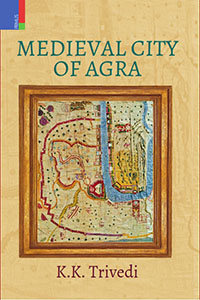
INFORMATION
- AUTHOR : K.K. Trivedi
- HB ISBN : 978-93-86552-40-2
- Year : 2017
- Extent : 196
- Discount available on checkout
- Usually dispatched within 3 to 5 working days.
INFORMATION
- AUTHOR – K.K. Trivedi
- ISBN – 978-93-86552-40-2 1
- Year – 2017
- Extent: 400 + 40 coloured illustrations
- 10% discount + free shipping
- Usually dispatched within 3 to 5 working days.
This book on the city of Agra makes a close examination of this medieval Indian urban centre that grew into a multifunctional town completely outside of the supposed agenda or impact of Turkish rule, as well as European influence. This enquiry uncovers possible deliberations in the evaluation of a settlement that was unknown in the sixteenth century, but which was to develop into an alternate prominent political centre in northern India. It is argued that while Agra derived its political strength from restructured governance, the location of the town contributed towards its economic development that, in many ways, helped it become the base of operations in intra-regional and international trade and finance for products from far-flung regions of the subcontinent. The book also ruminates on the development of arts and culture under the fostering care of the Mughals which, in the later period, influenced the refinement of regional cultures.
This book argues against the subjective approach to the evolution of medieval Indian towns, and on the generic conceptualization of towns, or their categorization as administrative, commercial or religious centres.
The Author
K.K. Trivedi has retired as Professor of Medieval Indian History, Jawaharlal Nehru University, Delhi.
This book on the city of Agra makes a close examination of this medieval Indian urban centre that grew into a multifunctional town completely outside of the supposed agenda or impact of Turkish rule, as well as European influence. This enquiry uncovers possible deliberations in the evaluation of a settlement that was unknown in the sixteenth century, but which was to develop into an alternate prominent political centre in northern India. It is argued that while Agra derived its political strength from restructured governance, the location of the town contributed towards its economic development that, in many ways, helped it become the base of operations in intra-regional and international trade and finance for products from far-flung regions of the subcontinent. The book also ruminates on the development of arts and culture under the fostering care of the Mughals which, in the later period, influenced the refinement of regional cultures.
This book argues against the subjective approach to the evolution of medieval Indian towns, and on the generic conceptualization of towns, or their categorization as administrative, commercial or religious centres.
The Author
K.K. Trivedi has retired as Professor of Medieval Indian History, Jawaharlal Nehru University, Delhi.




